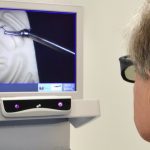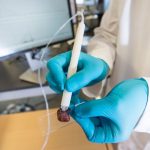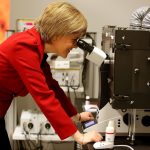Katrine Bosley’s Race To Make Gene Editing A Medical Reality
There’s no cure for Leber congenital amaurosis (LCA), a retinal disease that results in severe vision loss at a young age. Its cause is well understood, though: a genetic mutation. If you could find a way to cut out that gene and replace it with a “clean” version, you could cure it. You might also be able to apply the same method to thousands of other diseases caused by gene mutations.
Five years ago, this was a medical pipe dream. But if Katrine Bosley, CEO of Cambridge, Massachusetts, biotech company Editas Medicine, pulls off her ambitious plans, it could be real as soon as next year. After a successful IPO raised $94 million in February—on top of $163 million in earlier funding from Bill Gates, Google Ventures, and others—Editas is the richest of a small group of startups vying to be first to market with therapies that use a groundbreaking gene-editing technology called CRISPR. In addition to leading the funding race, Bosley is also likely to be first to begin clinical trials; she’s planning to test a therapy for LCA on humans in 2017 (none of her competitors have set a deadline for similar testing). As drug-development timelines go, it’s wildly aggressive—CRISPR’s gene-editing potential was only discovered in 2012.
But Bosley is convinced she has to move quickly. If the LCA treatment works, it could herald one of history’s biggest medical breakthroughs. “The science captures the imagination even if you don’t understand it,” she says. “It sounds like science fiction, except now we see data showing it’s on the brink of becoming reality.”
Conceptually, CRISPR (or CRISPR-Cas9) is simple: Think of it as minuscule scissors with an automated guidance system. Scientists program a strand of RNA to find a specific section of DNA, then attach the RNA to an enzyme called Cas-9 that cuts the DNA. The cell’s natural repair mechanisms fill in the gap with a normal gene. CRISPR has revolutionized the lab, where it’s widely used to edit the DNA of microbes, plants, and animals.

Right now, nobody knows how best to apply CRISPR to humans. Bosley believes that focusing initially on LCA, a disease of the eye (a small and easily accessible organ), could offer the best chance of success. LCA is rare, but a successful treatment would give Editas—founded in 2013 by scientists from MIT, the University of California, Berkeley, and Harvard Medical School—the proof of concept needed to move forward with more challenging treatments for disorders such as cystic fibrosis.
There’s another reason Bosley is in such a hurry. CRISPR is now at the center of a major patent dispute, which could cost Editas access to a dozen patents that it currently has exclusive use of. In March, the U.S. Patent and Trademark Office began a proceeding to reexamine its 2014 decision giving a key CRISPR patent to scientists from the Harvard and MIT–affiliated Broad Institute rather than a group from UC Berkeley. At issue is who invented the use of CRISPR in the cells of higher animals, including humans.
Editas has licensed certain rights to use CRISPR for developing and commercializing specific drugs from the Broad Institute team, and one of its lead scientists, Feng Zhang, is an Editas cofounder. Meanwhile, the company’s main competitors, Intellia and CRISPR Therapeutics, rely on licenses tied to the Berkeley group. Further complicating the situation, Jennifer Doudna, head of the Berkeley team, was also an Editas cofounder, but left in 2014 for undisclosed reasons.
If the Berkeley group ends up controlling the patents, then Editas’s license would no longer be relevant, and the company would have to negotiate a new deal to use the technology. Unless the parties reach an agreement to share rights, the case and appeals could drag on for years.
It’s a tricky position for a CEO—pushing her company to innovate while simultaneously navigating media scrutiny and potential fallout from the legal battle. “It takes a special individual to manage around this situation,” says Kevin Bitterman, a partner in the Boston VC firm Polaris who served as Editas’s interim CEO before hiring Bosley as his replacement in June 2014. “Katrine is a problem solver at heart. She also has the rare quality of being able to toggle between macro issues—what this means for medicine, the ethical implications—and the details. Many CEOs are good at one or the other. It’s rare to have a grasp on both.”
Bosley, a 25-year biotech vet who previously ran cancer-drug developer Avila Therapeutics, is working to ensure that Editas’s efforts won’t be entirely reliant on the contested patents. She says she has gathered an arsenal of strategic licenses, academic advisers, and in-house scientists that should keep Editas competitive regardless of how the Patent Office eventually rules. And in many respects, she says, the competition is motivating. “We all push each other, and that makes the science move more quickly. Everyone has people in their lives who suffer from diseases without a cure. I’ve had a couple of moments in my career where I was shaking, because it was so overwhelming to see a drug working far better than we’d imagined. I want to have as many of those moments as possible.”
A version of this article appeared in the June 2016 issue of Fast Company magazine.
Fast Company , Read Full Story
(56)














